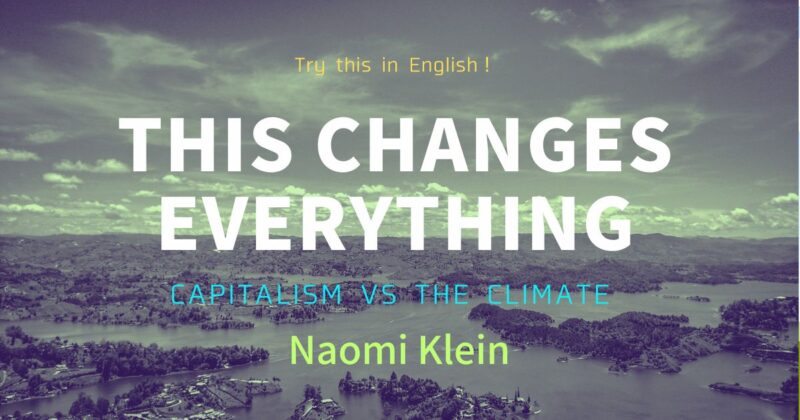Hi! It’s konkaz (@konkazuk).
The book I’m introducing this time is “This Changes Everything“, written by Naomi Klein, a world-renowned Canadian journalist, author, and environmental activist.
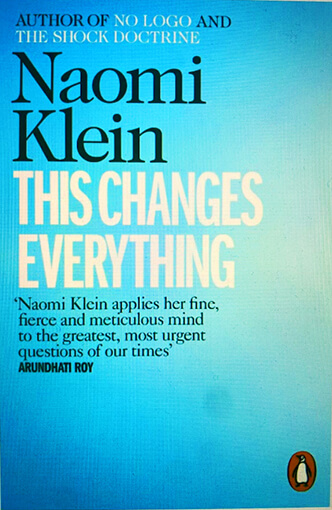
Under the Paris Agreement, the goal was to keep the rise in global temperatures since the Industrial Revolution below 2°C, while striving to limit it to 1.5°C.
Unfortunately, in 2024, we have already surpassed the critical threshold of 1.5°C, a point where the impacts of climate change are said to become significantly more severe.
Naomi Klein mentioned that she spent five years writing this book. As the subtitle “Capitalism vs The Climate” suggests, the book delves deeply into the intense history of the battle between the oil industry and those fighting to protect the environment.
This book came out in 2014, so you might think it’s a bit outdated. But with everything happening now, like Trump winning the U.S. presidency, it couldn’t be more timely.
In fact, now is the perfect time to read this book, let its shocking truths sink in, and take a hard look at yourself, thinking, “Damn! What the hell have I been doing in the middle of this crisis?!
This is an absolute must-read for all humanity living on this planet!!!
Who is Naomi Klein?

To begin, here’s a quick overview of the author.
Naomi Klein is an acclaimed journalist, columnist, and globally renowned writer, with her works featured among the New York Times bestsellers.
In her earlier works, No Logo (2000) and The Shock Doctrine: The Rise of Disaster Capitalism (2007), Klein focused on the issues of capitalism. However, with the publication of “This Changes Everything” in 2014, she shifted her focus to environmental issues and became actively involved in global social movements.
There is a video of her giving a lecture around the time this book was published. It’s a little lengthy, but if you have time, feel free to watch below.👇
We all need to become environmental activists!
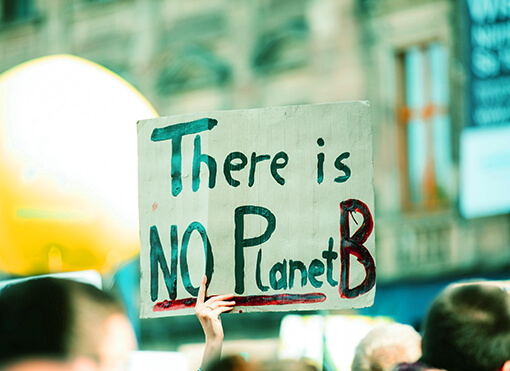
Even Naomi, who is now known as a global environmental activist, initially thought,
“Science is too complicated… “
“Environmental issues will be handled by the activists…”
And for a long time, she turned a blind eye to this urgent reality.
It appears that it took a considerable amount of time before she realised she needed to take action and began engaging in activities.
The main reasons why many people don’t take action on their own are:
① With the rapid advancement of technology, they hope that someone will invent a device to extract CO₂ from the atmosphere, solving the issue for them.
② They recognise the issue but focus on economic growth, believing that accumulating wealth will protect them from extreme weather events. (How much will wealth really help when entire cities are submerged?)
③ When watching news about disastrous natural events, they see it as something distant and abstract, telling themselves they don’t have the time to worry about it right now.
④ The problem seems too overwhelming, so they convince themselves to only focus on personal things like meditating, buying from local markets, reducing waste, or stopping driving, forgetting to put effort into changing the system that makes this crisis unavoidable.
⑤ While they recognise the severity of the problem, the busyness of daily life causes them to forget about it, going through a cycle of thinking, “This is terrible, I have to do something!” → Then forgetting about it.
How was that?
Everyone, don’t you think at least one of these applies to you?
If we let things go on like this, increasing CO₂ emissions year after year, major cities will eventually be flooded, ancient cultures will be lost to the ocean, and there’s a strong chance our children will face deadly storms, extreme droughts, food shortages, and the constant task of repairing the damage from disasters.
It’s easy for these things to become a reality.
All we have to do is continue with our usual lives, keeping our eyes turned away from the reality.
Naomi is convinced that if we fight this issue using the same methods that resolved problems like slavery, racism, gender discrimination (such as voting rights), and apartheid, we can solve it too.
In other words, unless we come together and take action, we will fail in this fight as individuals.
Capitalism vs Climate Change

“So, if we unite, who or what are we fighting against?”
“Who exactly is responsible for destroying the planet?!”
The answer, in short, is the “oil companies“, which are responsible for over 75% of the world’s greenhouse gas emissions by continuing to extract fossil fuels.
When you hear “oil companies”, I think many people experience a fog of abstraction descending over their minds, and they immediately feel, “Oh, this is beyond me” or “I can’t connect this to my everyday life, so I can’t picture it”.
That’s right. The enemy is huge. That’s why we must unite.
However, even if we’re going to fight, I believe it’s important to first understand what the enemy is doing, so here I’ll highlight a few points from Naomi’s book.
We are being controlled by the owners of enormous wealth

Even when we try to tackle the issue of environmental destruction, the political system plays a major role in blocking our efforts.
One typical example is when oil companies are sued for causing environmental pollution, and their response is,
‘Okay, understood. We’ll establish regulatory agencies to minimize pollutants and address the issue.’
and such organisations are then created.
The organisations set up in this manner may appear, at first glance, to be responsible for supervising environmental protection, giving the public the impression that progress is being made on environmental issues. However, in practice, they are funded with substantial amounts of money and serve to obstruct environmental groups while supporting corporate profits.
Furthermore, the reality of climate change is an inconvenient truth for the capitalist economy, particularly for the right-wing free-market system supported by the wealthy.
Therefore, they invest enormous sums of money and use organisations like the ‘Heartland Institute’ to intentionally reject the scientific facts of climate change, while working to spread these lies through the media and politicians. They also apply pressure on television networks to prevent disaster-related news from being broadcast.
By doing so, they are encouraging the public to become indifferent to environmental issues, reducing the pressure for action.

The Swedish environmental advocate, Greta Thunberg, who has passionately fought for climate action since her youth, has also been treated as the villain in Japan at times.”
Consumerism

Since the Industrial Revolution, technological advancements have made mass production possible, leading to an overflow of products in the market.
Especially after World War II, supply began to exceed demand, leading to a system where advertising was used to stimulate consumer desire among the general public, ultimately creating a society of mass consumption.
The increase in individual consumption is highly desirable for governments and corporations.
Thus, they have boldly charged forward under the dangerously misguided theme that…
“Greed and the limitless pursuit of profit are nothings to apologise for but rather humanity’s greatest hope for liberation.“
And backing these governments and corporations are none other than the “oil companies“.
Many products, including plastics, are made from petroleum, meaning the demand for fossil fuels is directly tied to economic growth. As a result, governments tend to prioritise protecting the profits of oil companies through subsidies and tax incentives.
For this reason, even when environmental organizations call for cutting fossil fuel consumption and shifting towards renewable energy, oil companies fiercely push back.
Moreover, for the right-wing (those who support the wealthy), acknowledging the reality of climate change would mean endorsing the ideas of environmental groups and the left-wing (those who support ordinary people), which would threaten their own purpose and relevance. For this reason, they cannot bring themselves to admit the reality of climate change.
The reasons why oil companies continue to extract fossil fuels
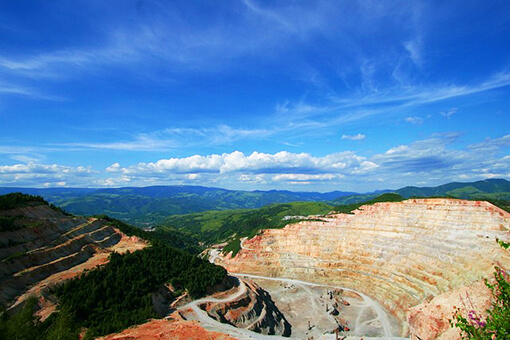
The motivation behind oil companies’ fossil fuel extraction is no different from that of companies selling cars and clothes.
Like companies that sell vehicles or apparel must assure shareholders of future product demand, oil and gas companies are compelled to prove they can replenish carbon reserves after exhausting their current production.
There is a measure called the reserve-replacement ratio, which indicates how much of the resources extracted and consumed are being replaced with new reserves. If this ratio falls below 100%, it suggests that resources are running out, raising concerns about the future viability of the oil company.
For oil companies, maintaining the reserve-replacement ratio is an economic necessity, and achieving this requires constant activity.
This structural necessity drives the industry toward the most extreme forms of polluting energy use.
Shareholders expect the same enormous profits next year as they did this year or the last, which is why major oil companies secure rights to future oil extraction. However, it’s said that these commitments surpass the CO₂ emission limits set for 2050 by nearly five times.
Allowing this to continue will inevitably lead to the end of humanity’s time on Earth.

In addition, the outcome of the recent presidential election has worsened the situation, as Americans elected Trump, who supports expanding oil extraction.
The wealthy individuals tackling environmental issues won’t save us
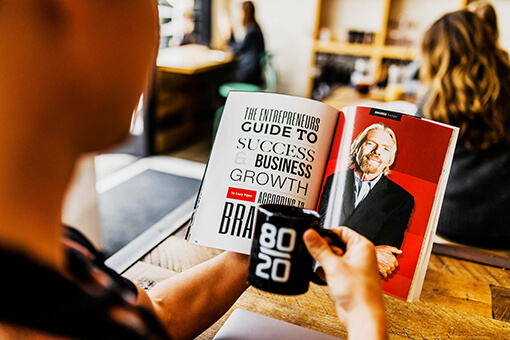
In her book, Naomi also touches on Richard Branson, the head of the Virgin Group, who is often seen as a relatively refreshing entrepreneur with a strong image of social contribution.
In 2006, he was suggested by Al Gore, the former Vice President under the Clinton administration and later an environmental activist, to use Virgin Airlines as a catalyst for change in order to raise awareness about the crisis of global warming.
Jeremy Grantham, Warren Buffett (who owns a significant amount of oil company stocks), Michael Bloomberg, and T. Boone Pickens all briefly showed interest in green issues, but they were ultimately of no use. On the other hand, Bill Gates is focused on developing machines to extract CO₂ from the atmosphere, but he has no interest in renewable energy.
This is why Richard Branson was chosen as the green hope.
He announced that the profits from Virgin’s fossil fuel-powered transportation would be reinvested into efforts to combat global warming and used to develop new clean fuels and jet engine fuels.
On top of that, he established the “Virgin Earth Challenge” in 2007, a competition offering a $25 million prize for ideas in climate technology.
… However, regrettably, the prize was called off in 2019 due to uncertain market conditions, and it ended up not producing any concrete outcomes.
But surprisingly, he has managed to achieve various successes at the same time…
⚫ Launched a new flight route to Dubai
⚫ Established a new airline, “Virgin America”, to compete in the U.S. domestic market. (At the time, Virgin America expanded from 40 flights in its first year to 177 flights across 23 destinations, with plans to add 40 aircraft by the middle of the next decade.)
After promising to take climate action, Virgin Airlines’ greenhouse gas emissions increased by approximately 40%.
After that, he expanded into Virgin Racing (F1) and Virgin Galactic (space travel)… at this stage, it’s obvious he’s driven by the typical “grow or die” mindset.
We have been completely betrayed!
*Virgin America was taken over by Alaska Airlines in 2016, and the Virgin America brand was gradually phased out afterwards.
What can we do against such giant corporations?

Up until the end of Part 2, this book is filled with harsh realities and a pessimistic mood, but from Part 3 onwards, it highlights the resistance movements led by local people around the globe, showing that hope is emerging as these movements spread.
“Blockadia”: grassroots protest movements focused on local issues
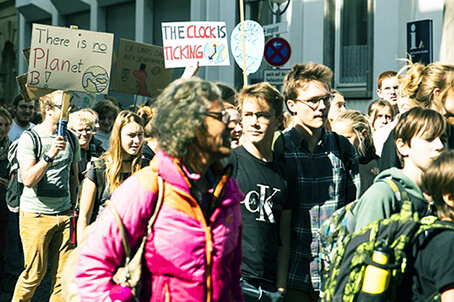
There is a term called “sacrifice zone“.
It’s a truly unpleasant term, but “sacrifice zone” refers to areas that are sacrificed for environmental destruction or industrial activities.
The selected areas are typically impoverished or remote, out-of-sight locations far from cities, where the residents often have minimal political power. Moreover, racial, linguistic, and class issues are frequently involved.
The purpose of selecting sacrifice zones is usually for oil drilling, coal mining, or establishing toxic waste disposal sites. And in order to persuade local residents, industry representatives commonly say things like this:
⚫ The project promises to generate a significant number of jobs.
⚫ It aims to develop key infrastructure like roads, schools, and hospitals.
⚫ The project will contribute to the development of the local area.
⚫ Compensation will be paid to the residents who agree to it.
⚫ The company claims to have technologies that minimize environmental damage.
… but, generally, most of these are never achieved.
Conversely, the people living in these zones are confronted with health issues (such as respiratory diseases and illnesses caused by polluted water) and social disparities (like unemployment and the loss of land rights), and eventually realise that they have been abandoned.

Another shocking fact is that in regions where natural gas extraction has taken place, such as Dimock in Pennsylvania, methane gas has been found in the tap water, and there have been documented cases of it catching fire from a lighter*.
*See the 2010 documentary film “Gasland” for reference.
However, once these events were exposed through social media, grassroots movements started to form, with local populations rising up against massive industrial projects, especially oil, gas, and mining developments.
The author, Naomi, refers to these actions as “Blockadia“, describing them as social and political movements where communities rise up to create a sustainable future.
At the heart of “Blockadia” is an attitude that emphasises solidarity and self-determination among local residents, who rise up to protect their future and expand their efforts in cooperation with other regions around the world.
This social and political movement is currently taking place on a global scale, representing a powerful effort to oppose existing industrialism and protect the environment and people’s rights.
From Romania, an image of an old woman wearing a babushka (a headscarf) and holding a knobby walking stick went around the world, with a caption like…
“You know your government has failed when your grandma starts to riot.“
Divestment movement
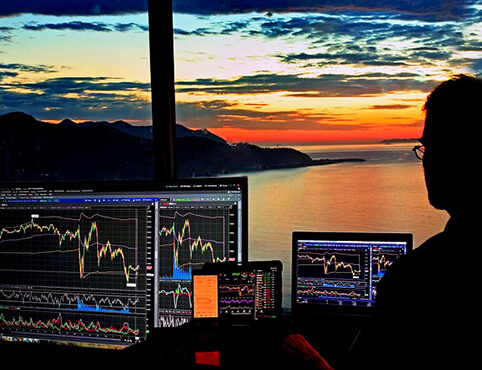
Another rapidly growing movement is the “Divestment” campaign, which focuses on withdrawing investments.
This movement urges institutions with public interests, like universities, religious groups, and local governments, to sell off their stocks in fossil fuel-related companies.
The aim of this movement is to undermine the reputation of fossil fuel companies and diminish their political influence.
Both “Blockadia,” as mentioned earlier, and the “divestment movement” have strongly influenced mainstream environmental organizations*, particularly large environmental groups that had ties to fossil fuel companies.
*Greenpeace, WWF, and the Sierra Club were once in partnership with fossil fuel companies, but due to the influence of these movements, they have now cut their connections.
It basically says that…
it is the height of hypocrisy for institutions like schools, established to prepare for the future of the next generation, to profit from industries that are causing dangerous activities leading to climate change and creating an uninhabitable planet.
Ultimately, the goal is to move away from investments in fossil fuel industries, including oil, natural gas, and coal, and shift focus to clean energy and sustainable ventures.
Solving environmental issues will help address the problems of an unequal society.
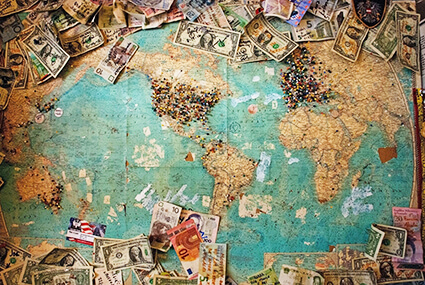
One thing I’ve come to understand after reading Naomi’s book and other similar works on environmental issues is that addressing environmental challenges can help resolve the problems of an unequal society.
Currently, our world is economically divided into a polarized structure of the “Global North” (developed countries) and the “Global South” (developing countries). The first to suffer from climate change are those living in poverty or in developing nations.
Countries facing economic hardships tend to have insufficient living infrastructures, making them less able to withstand environmental disasters such as floods, droughts, and hurricanes.
Economic support from developed countries to developing nations, aimed at transitioning to clean energy and promoting sustainable agriculture, can provide new economic opportunities for local communities and create jobs that help lift people out of poverty.
In other words, tackling environmental problems can help stabilise their lives while also reducing social disparities.
And conversely, when inequality increases, it delays policy-making and implementation, as we’ve seen at COP, making it even harder to combat climate change and build a sustainable society.

So, it means that left-wing parties, rooted in socialist ideals, should take the lead, rather than right-wing parties focused on fulfilling the desires of the rich while advocating for free-market policies.
To wrap up…
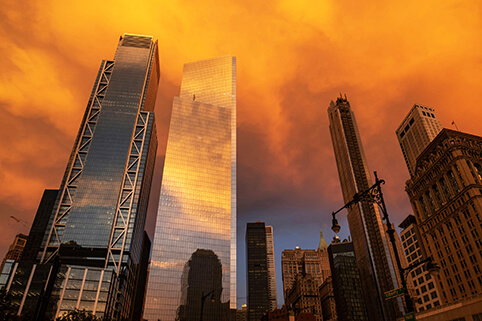
This article has become quite lengthy, but since each page of the book contains crucial insights, what I’ve covered here is only a small part of it.
From my personal perspective, the struggle of environmental groups trying to prevent the greedy right-wing people and the ordinary citizens who are mind-controlled by them reminds me of the scene in Hayao Miyazaki’s film “Nausicaä of the Valley of the Wind”, where Nausicaä cries out ‘Don’t go that way!’ to the swarm of Ohmu, or of Chihiro’s efforts to rescue her parents, who have been transformed into pigs, in “Spirited Away”.
While regular citizens celebrate Trump’s win, saying things like, ‘Hooray, Bitcoin’s rising!’ or, ‘I’m going to work hard today to earn money and secure assets for my kids!’ by the time their children inherit that wealth, it’s highly likely that the Earth will have become an uninhabitable environment for humans.
If we, living in developed countries, don’t make ‘solving environmental issues‘ a central focus of our daily lives, this problem won’t be solved. Yet, we’ve become too comfortable in our cozy lives, no longer seeing the reality of what’s happening around us.
To make a difference, I believe that individuals need to read several books or articles on environmental destruction, in either Japanese or English (starting with the ‘Guardian’ is a good idea). This will broaden your understanding of the issue, enabling you to convey its importance to those closest to you.
(It might seem like a religious preaching mission, but in reality, we need that level of passion, or things could get really bad…)
Anyway, thank you for taking the time to read this until the very end.
Until next time.
konkaz
*You can read this blog post in Japanese from the link below.
👉 気候変動と資本主義:ナオミ・クラインの著書『This Changes Everything』を読むべき理由

